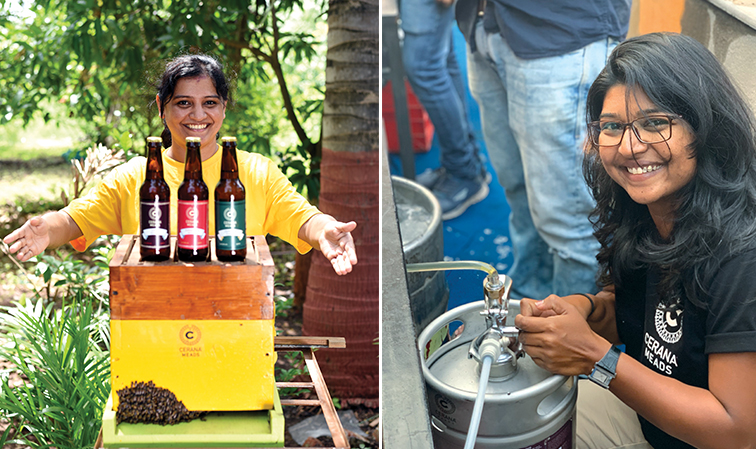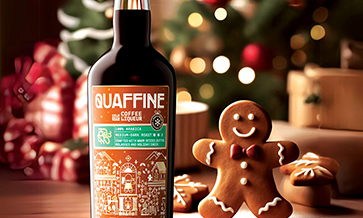Young bio-entrepreneurs turn passion for bees into honeyed treats
The alcoholic beverages industry is going through some very exciting times. The artisanal micro-brewing segment has seen some very passionate entrepreneurs brewing interesting concoctions.
I recently came across two extremely motivated women, Ashwini Deore and Yoginee Budhkar, who have forayed into the big world of alcobev with a very niche product: mead. Their Nashik-based company is named Mahuwines Meadery LLP.
Following the launch of their products in November 2019 in Mumbai and Nashik, I caught up with them to discover the fascinating history of meads; how India lost out on it in recent times; and how these young entrepreneurs are offering us a taste of history in a glass!
Ashwini and Yoginee did their doctorates together from the Food Engineering and Technology Department at the Institute of Chemical Technology, Mumbai. Ashwini’s Ph.D. is in Bio-process Technology and Yoginee’s is in Bio-technology.
What’s mead?
Mead is a very versatile beverage made from fermenting honey water. Meads can range from bone dry to deliciously sweet. Meads can be low on alcohol (3-7% ABV) or really high (18-20% ABV). Meads can be made with honey in combination with a range of other interesting ingredients: a variety of spices, or fruits, or even flowers.
Like wines, meads can be still or sparkling, can be with or without oak ageing.
We can categorise meads based on the alcohol content or the ingredients. Low alcohol mead is called a ‘hydromel’. Medium alcohol mead is ‘standard mead’ and very high alcohol mead (over 18% ABV) is called ‘sack mead’.
Yoginee was introduced to the amazing world of honeybees in the course of her studies for her Master’s degree in zoology. “I was always fascinated with their social structure and behavior, and their impact on the environment,” she remembers.
Making mead brings together her diverse interests in honeybees, bee-keeping, honey, its fermentation, alcoholic beverages and doing something new.
While working on her doctorate, a professor from the UK encouraged Yoginee to try the heather honey mead during her travel to Edinburgh. “Unable to find mead locally, I experimented with making my own. Surprisingly, my experiments turned out quite well and were appreciated by those who tried it,” she says.
Bees buzz
That motivated Yoginee to get better, so she started studying it more diligently. As she read more about its rich history and the amazing varieties of mead that could be made, the hobby turned into a passion and she decided to take it up full time.
“I told Ashwini about it. She was just wrapping up her post-doctoral work in Toronto (Canada) at the time. She came back and we started this journey together,” Yoginee adds.
As a first step to transitioning from mead making as a hobby to doing it professionally, Yoginee went to the US to study the advanced technology and business of mead making.
Ashwini pipes in: “Our brand is called Cerana because honeybees belong to the genus Apis and the species found in Asia and India is called Apis cerana. It is a tribute to the Indian honeybee.”
The duo is proud to be part of an industry which makes environment conservation fun! Honey is purely a value-added product that comes from the nectar in flowers. Honeybees pollinate these flowers in the process and create a more robust next generation of plants.
“Most of our honey is multi-floral honey collected from the forests in Himachal Pradesh and Karnataka. These forests have minimum human intervention, and bees collect the nectar from flowers free of any pesticides or insecticides,” Ashwini says.
Ashwini is a WSET 1 (London) qualified professional in wines and spirits, and has attended a workshop on the sensory experience by VLB, Berlin.
“The fruit we use in our meads are locally sourced and processed. There are no artificial colours or flavours in our meads. Only honey, fruit, water fermented with yeast, which is then filtered. The simple process preserves the flavours and taste and it is evident in every bottle of Cerana,” she adds.
Indian flavours
Presently Mahuwines Meadery makes three meads. Pomegranate Melomel (generic name for all fruit-based meads) is made with flavourful and floral lychee honey fermented with fresh pomegranate juice.
Jamun Melomel is more robust in taste with earthy jamun honey and astringent jamun fruit providing a layered and complex flavour.
Chenin Blanc Pyment (mead made with grapes and honey) is made with spicy multi-floral honey from the Himachal forests and Chenin Blanc grapes from Nashik.
Yoginee and Ashwini are incredibly happy to be a part of the revolution that has started in the country for craft alcoholic beverages. “A lot of new brands are entering the market. We are small in comparison, but what we offer are meads that are natural and carry the essence and goodness of all its ingredients in their purest form,” says Yoginee.
All their meads are dry to off-dry – they have very little to no residual sugar. The emphasis is on showcasing the produce and bringing out the essential Indian flavours.
Smart consumers
According to Yoginee, consumers these days are more aware of how their choices impact society and environment. People today are also eager to experiment and expand their exposure to different beverages, as can be seen in the manner that wines have taken off over the last decade.
“A large group of health-conscious drinkers may choose our product over beers because mead is gluten-free due to the absence of malts,” she adds. On the cards is the launch of high-alcohol still mead with an exciting recipe.
Mahuwines Meadery is currently making hydromels, which are low alcohol, carbonated meads, and which offer complex flavours and multi-layered taste. With favourable policies and innovation in product development, new talent will definitely enter this industry.
As an industry, meads are expanding fast in India – there are already five operational meaderies in Maharashtra. The state got a head-start for the mead industry due to policy changes to include mead as a sub-category of wine in the excise department’s list.
“For Cerana, we are hoping that the lifting of lockdown allows us to get our marketing up to speed and to add collaborations with the food industry, wherein we will get an opportunity to interact with our customer directly,” says Yoginee. “That will result in vertical growth in terms of our reach and distribution.”
“Once the market shows a favourable response and the brand name is out there, we will expand our range so that we can offer a choice to every potential mead drinker,” Yoginee signs off. So here’s wishing this duo the very best for their exciting journey. (www.ceranameads.com)













